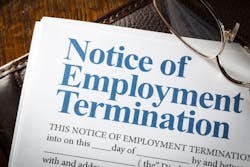Most people look forward to firing an employee with the same anticipation as a root canal. Terminations and root canals both suck. The difference is no one feels guilty about a root canal. You often will feel guilty about firing someone. Here is how you can handle it.
It’s Good to Feel Bad
If you feel bad about the need to terminate someone, it shows you are human and compassionate. The last thing you want is to become so inured to terminations that they no longer bother you. Of course, they do get easier with experience, but they never get easy.
Even when the employee deserves it, when you have reached the point where you loathe the employee so much you hate the sight of him, the actual act of termination is still painful.
Even when the employee deserves it, when you have reached the point where you loathe the employee so much you hate the sight of him, the actual act of termination is still painful. It should be. It is an extreme action and should never be done frivolously.
You’re Setting Someone Free
When you terminate an employee, it usually means the employee is not a good fit. Your company is not the right company. He needs to find somewhere else to work, somewhere where he can be successful.
Sure, the employee could leave at any time. It is a free country. Yet, he has not left. Often, the reason is fear. He may be miserable with you and you with him, but you are the known and the unknown is frightening. When you terminate him, you set him free to find the right position with the right company where he can be successful.
Anyone Who Wants a Job Can Find One
This is one of the best times in history for job seekers. There are actually more job openings than unemployed. Anyone who wants a job today can find one. It may not be ideal. It may not be perfect. It may not pay as much as desired, but it is a job. Every job is a starting point, not an end. You are not depriving the employee of work, just work at your organization.
Most Terminated Employees End Up Better Off
Surprisingly, within a year’s time most terminated employees end up better off than they were before they were terminated. True, depending on the length of their unemployment and the path they follow, they might have a financial hole to dig out of, but the place they land is a better fit. They are happier.
Add Up the Compensation
If you feel terrible about the financial impact of a termination on an employee, add up the compensation you have paid. Then add the cost of all of the benefits. If the individual has been with you for any length of time the numbers will add up fast and significantly. Yes, getting fired will be a hardship, but all in all, adding up the total compensation shows how much the individual has received from you in the past.
The Company is Bigger Than Any Individual
In almost every instance, employees are terminated because they have become liabilities to the company. Their performance might be sub-par. They might get in one vehicle accident after another. They might be moonlighting. The possible reasons are many.
When someone who is a source of drama or a drag on performance is relieved of his position, a dark cloud over the organization lifts.
Keeping them around hurts the company, which puts everyone’s income at risk. The company is bigger and more important than any individual, even if the individual is a high performer.
The Atmosphere Improves
When someone who is a source of drama or a drag on performance is relieved of his position, a dark cloud over the organization lifts. The atmosphere gets better. People are happier to come to work. Overall performance improves.
Most people in an organization know someone is not going to make it long before management takes action. This is why other employees often comment that they are surprised the termination took so long. When it finally occurs, there is a collective sigh of relief.
Ultimately, People Fire Themselves
In football, when the ball carrier steps out of bounds, the referee rules him down. Because the ball carrier stepped out of bounds, he cannot continue to play. The referee does not push the ball carrier out of bounds. The ball carrier steps out on his own. The referee is applying the rules.
Similarly, when an employee steps out of bounds, his supervisor applies the rules. For example, if the company has a policy preventing facial piercings and a technician shows up with a nose ring, the tech is stepping out of bounds. Unless he removes the nose ring, he is choosing to quit. He is firing himself. His supervisor is merely enforcing the company rules. The action is all on the employee’s part.
Terminations are not fun. Growth is fun. For the help you need to grow your business, visit the Service Roundtable, the industry’s largest business alliance. Membership is just $50 per month. Learn more at www.ServiceRoundtable.com or call 877.262.3341.
About the Author
Matt Michel
Chief Executive Officer
Matt Michel was a co-founder and CEO of the Service Roundtable (ServiceRoundtable.com). The Service Roundtable is an organization founded to help contractors improve their sales, marketing, operations, and profitability. The Service Nation Alliance is a part of this overall organization. Matt was inducted into the Contracting Business HVAC Hall of Fame in 2015. He is now an author and rancher.
